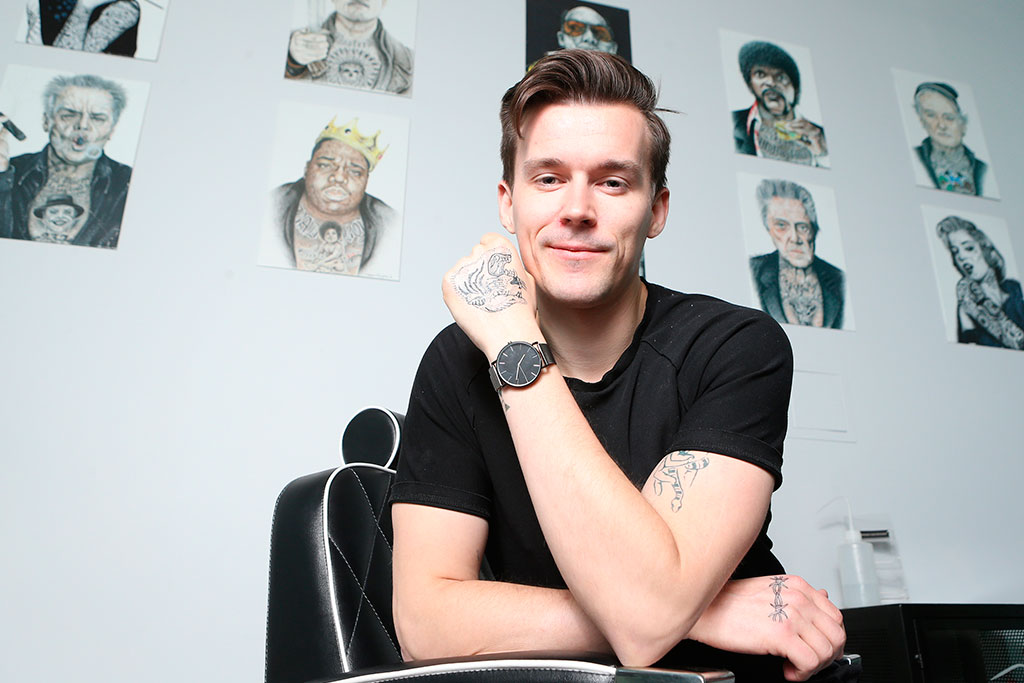[vc_row][vc_column][vc_column_text]Toronto based Tattoo Brand Inkbox, launches initiative to help out of work tattoo artists generate revenue with curated, ready-to-wear temporary tattoos, designed by the artists themselves. [/vc_column_text][vc_separator][/vc_column][/vc_row][vc_row][vc_column][vc_column_text]Of the many industries facing loss of business as a result of COVID-19, the tattooing industry has all but halted. Unlike some businesses that have been able to re-navigate themselves online, tattoo artistry, as a person to person profession has been less able to effectively virtualize business.
Toronto based start-up company Inkbox, a direct-to-consumer tattoo brand that creates patented temporary tattoos lasting one to two weeks before fading naturally with skin regeneration, experienced this head-on.
In early March, Co-Founder and CEO, Tyler Handley, was forced to close their tattoo studio, Inside Out, located in the heart of Toronto. The reality that tattoo artists would face temporary unemployment for the foreseeable future jarred the profession overnight.
As a company that has always supported the community and culture it is inspired by, creating a way to support it felt like second nature. The unique challenge Inkbox faced was to create a way to cultivate revenue for a profession that relies on physical contact, in the height of a pandemic. [/vc_column_text][vc_column_text]With thousands of artists now out of work, Handley noticed a number of tattoo artists beginning to sell merchandise as a way to generate revenue. “At the same time,” says Hanley, “we noticed tattoo enthusiasts around the world posting about their desire to get inked by their favourite artists; many were saying that not being able to get tattooed because of COVID-19 was making them want tattoos even more.”
In keeping their ear to the needs of their community, Tyler Handley says the opportunity to launch Inkbox’s Supporting Tattoo Artists Campaign, allowed the company to help artists earn income during the pandemic while enabling customers to scratch their tattoo itch.
“We sell tattoo artist’s designs on Inkbox and give $10 back to the tattooer for every design sold. So far we’ve launched designs from over 30 artists and have hundreds more in the pipeline,” said Handley.
This initiative is in addition to their initiative to produce and donate PPE [personal protective equipment] to front line workers. These acts of leadership in crisis, is something Inbox describes as ‘just doing their part’.
For this week’s addition to Bay Street Bull’s Start-Up Spotlight series, we spoke with Tyler Handley about acting as a leader in your community during a crisis and how failure can lead to victory. [/vc_column_text][vc_single_image image=”17563″ img_size=”full”][/vc_column][/vc_row][vc_row][vc_column][vc_empty_space][vc_text_separator title=”Q & A “][vc_empty_space][/vc_column][/vc_row][vc_row][vc_column][vc_column_text]How does Inkbox disrupt the tattooing market and in what way is Inkbox’s temporary model revolutionizing the way society sees tattoos?
I wouldn’t say we’re disrupting the tattoo market. Rather, we’re expanding it. Tattoos are a method of self-expression and Inkbox offers a frictionless way to experience that without the permanence. We work with amazing tattoo artists from around the world to design many of our tattoos. In doing so, we increase access to tattoos designed by these artists for customers who, for whatever reason, might not be ready or able to get one of their tattoos permanently.
The consumer perception of tattoos continues to shift in a positive way. Tattoos are becoming more and more approachable, especially now that they come in so many different styles—there’s truly a tattoo for everyone these days. We’re doing our part to make sure the world has access to this wide variety of tattoos at the press of a button.
How has Inkbox had to re-examine business to operate within the lens of COVID-19?
When the COVID-19 pandemic became a reality back in March we decided on three guiding principles that would see us through this difficult time: a) do our part to flatten the curve; b) keep our employees safe; and c) keep our employees employed.
Guided by the first principle, we shifted all of our Research & Development focus to the development of personal protective equipment [PPE] at scale. We designed a custom face shield with Trillium Health Partners and shifted some of our production towards making them. To keep our employees safe we limited the number of production staff in the office to 20, implemented mandatory PPE usage, built plastic barriers six feet between staff members, and implemented enhanced cleaning protocols. [/vc_column_text][/vc_column][/vc_row][vc_row][vc_column][vc_column_text]What do you think is the role of community during a crisis and why has Inkbox taken it upon themselves to be a solution?
Community is ultimately about support. During times of crisis, you look to your communities for support and try to find ways to support them in return. This is precisely why we launched our Supporting Tattoo Artists campaign and decided to produce and donate PPE.
Business has a lot of ups and downs. When was a time that you felt your company was failing and how did you revive it? How has this informed or impacted the way Inkbox is managing during the pandemic?
Oh, too many times to mention here! I like to say that business is just a series of temporary bad decisions. We’ve made quite a few in our five year history. One recent example that comes to mind spanned almost the entirety of 2019. We launched a new iteration of our core product in November 2019 because the previous version wasn’t great, honestly—it was difficult to apply and the results varied wildly between customers. We spent a non-trivial sum of money last year developing the new product, which led to a high monthly cash burn. In Q4, alongside the release of the new product, we decided to balance the ship. We took a hard look at the business, stripped it down to its essentials, and built a much more sophisticated set of financial projections and protection measures. These changes have served us well in the volatile climate of COVID-19. A balanced ship weathers the storm.
Building an effective team can make or break a business, what qualities do you as an entrepreneur look for in your team?
In my experience, the most impactful team members are curious, driven, and honest. The best of the best have a t-shaped profile which means they have a breadth of experience but also a deep understanding of one particular vertical, be it operations, product, etc.
I think all successful entrepreneurs are problem solvers at heart. When you view the world as a series of problems that can be broken down into objectives and solved, then anything feels achievable.[/vc_column_text][/vc_column][/vc_row][vc_row][vc_column][vc_column_text]There are many points in life when things don’t go to plan or doubt gets in the way of success. What experience has given you the most courage to stand up for your ideas and worth?
Probably the time I stood up to an early board member of ours. At the time I was a young, hopeful entrepreneur with little business experience. He was a successful founder with a net-worth of half-a-billion dollars. He didn’t agree with me on a prickly share-related topic, and the conversation got heated. He yelled. He raged. I stood firm. I remained calm. I rebuked him and the decision went my way. What I learned: just because you’re successful doesn’t mean you’re right.
What in your opinion do entrepreneurs need to solidify success for their company? What defines for you, a good entrepreneur, boss or leader?
This is a heady question, the answers to which contain plenty of nuance. One thing that’s incredibly important though, is understanding your data. It might seem obvious, but it took me years to truly understand how reading data the right way could directly impact the business. I’m not talking about just looking at Google Analytics, I’m talking about asking the questions that have an impact on your business and then defining dashboards to track the answers to those questions.
To be an effective leader you need to understand how to decide what to focus on and when, then how to communicate that focus to your team.
What advice would you give to anyone just starting?
Understand what you’re naturally good at. Work on nurturing that skill-set then translating it to your business. Understand what you’re naturally bad at, and find the right people who can fill those gaps. [/vc_column_text][/vc_column][/vc_row]













